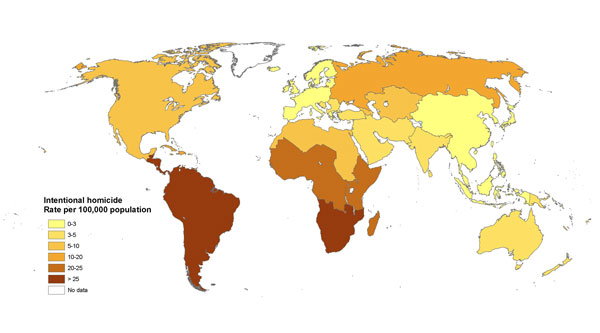The whole region is falling apart. Since the wars of the 1980s ended in Central America, the armies in the fields have been replaced by the youth gangs in the streets. Even in Costa Rica its a danger to walk alone at night; I can't even imagine what its like in the rest of the place.
There's really two or three major factors at work here. After the wars ended, most Central American countries had to undergo a triple transition: war to peace; from closed war economies to open globalized economies; and from authoritarianism to democracy. There have been problems that reinforce each other in each transition.
The destruction of the wars and the huge debt that befell each government occupied much of the resources in the early 90s, resource that were scarce to begin with (the 80s were a lost decade for economic development; there was virtually no growth in Latin America between the 70s and the 90s).
The re-insertion into the emerging global economy bore no fruits for the majority of the region, even as there was some economic growth during the past 20 decades, it has barely been enough to achieve the levels of the 70s, at the same time as each country was experiencing a boom in population. The gains made since 1990 have been very unevenly distributed; inequality is far and away the most important and most destructive structural problem that the region faces. Incomes of the top 10% have skyrocketed while the rest have stagnated in most places. Wealth inequality is part of the legacy of Spanish imperialism, which nearly all successive governments in the region have been unable or unwilling to solve. This inequality reinforces weak social mobility, which in turn fuels crime and discontent among the large, destitute majorities.
The shift from authoritarianism to democracy has been equally hampered by inequality and the ineffective insertion into the global economy. The fact is that though there are a great many formal democratic institutions and voting, most people have come to see the transition as superficial. Electoral systems are still controlled firmly by the powerful, who have shifted their instruments of domination from the blatantly military to the mirage of democracy. Many of those who were influential during the dictatorships continue to exercise their power with impunity in many other various ways; the phenomenon of generals-cum-businessmen who prop up many a political campaign. The security systems, which in the 80s were geared exclusively toward oppressing the population, have barely changed and the people continue to view them with suspicion as leaders have failed to address the impunity and repressiveness of the police and military.
Those are just some of the reasons for the current situation in Central America. "Mano Dura" tactics (heavy hand) have failed at addressing the problem; crime and instability will continue to be the norm as long as inequality continues to dominate the social landscape. Another massive phenomenon is that of the "maras" or youth gangs, many deportees who cut their gang teeth in the streets of Los Angeles and have since returned to fuel and strengthen transnational crime both in the United States and their respective states. It's a very complex issue that will take many years and effective planning to solve, both here and abroad. To be honest, I'm pessimistic on the prospects.
... Oh why do I bother; Yeah! Brown people are inferior! Put them in labor camps! Exterminate them!



